
Ghassan K. Abou-Alfa, MD, Spotlights Patients With Unresectable HCC Who May Best Benefit From Tremelimumab/Durvalumab

Patients with unresectable hepatocellular carcinoma who have recurrent disease following surgery or locally advanced diseases who will likely progress on local therapy may have an opportunity to benefit from tremelimumab and durvalumab following its FDA approval, according to Ghassan K. Abou-Alfa, MD.
Following the
Transcript:
The chance for recurrence of [unresectable HCC], even among patients who have a surgical resection is unfortunately very high. Understandably, patients who have received transplants—who hopefully will never have recurrence—might not be the right patients for the use of checkpoint inhibitors because of the transplant and immunosuppression that's already there. Besides that, patients who either have recurrent disease after surgery, locally advanced diseases that will fail local therapy, or those with systemic therapy will all benefit from [durvalumab plus tremelimumab]. This unfortunately is a large number of patients [in terms of] the separation of the different cancer stages. As such, almost every patient will have some opportunity to benefit from that therapy.
Reference
Imjudo (tremelimumab) in combination with Imfinzi approved in the US for patients with unresectable liver cancer. News Release. AstraZeneca. October 24, 2022. Accessed October 31, 2022. https://bit.ly/3Fbwx1w
Newsletter
Stay up to date on recent advances in the multidisciplinary approach to cancer.





































